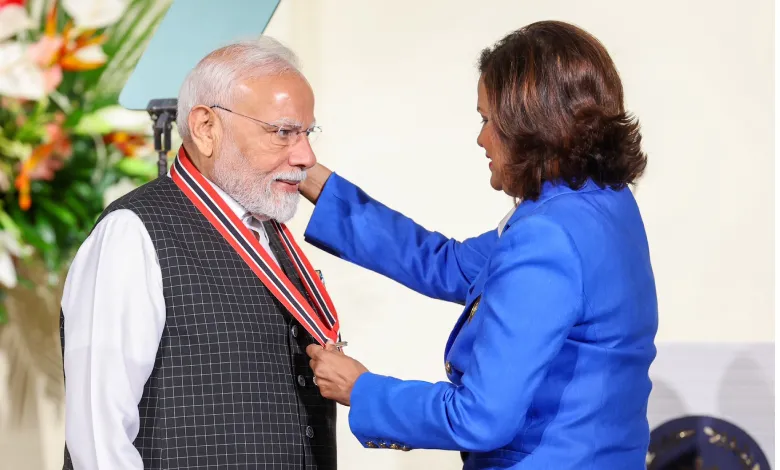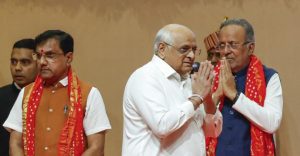Port of Spain, July 4 – In a landmark moment, Prime Minister Narendra Modi became the first foreign leader to be awarded the Order of the Republic of Trinidad and Tobago (ORTT)—the nation’s most prestigious civilian award. President Christine Kangaloo presented the honour at the Presidential Palace, recognising Modi’s influential global leadership, his strong engagement with the Indian diaspora, and his humanitarian contributions during the COVID-19 crisis.
Traditional Welcome with Cultural Touches
PM Modi arrived in Port of Spain on July 3, where he received a ceremonial Guard of Honour at Piarco International Airport. The reception included colourful cultural performances, such as a traditional Bhojpuri Chautaal, showcasing deep-rooted ties to Eastern Uttar Pradesh and Bihar—regions from where many Indian ancestors of Trinidadians migrated.
Modi was welcomed by Prime Minister Kamla Persad-Bissessar, along with 38 cabinet members and four parliamentarians. On social media platform X, Modi expressed gratitude and optimism for deeper cooperation, stating, “May the friendship between India and Trinidad & Tobago grow even stronger.”
Reviving Diplomatic Ties
This visit marks the first time since 1999 that an Indian Prime Minister has visited Trinidad and Tobago. It forms part of Modi’s five-nation tour, which started in Ghana—where he also received the Order of the Star of Ghana. The tour will also cover Argentina, Brazil (for the BRICS summit), and Namibia.
During his stay, Modi addressed both Houses of Parliament in Trinidad and Tobago. He shared India’s intent to collaborate across critical sectors such as healthcare, energy, agriculture, and digital technologies like artificial intelligence. Prime Minister Persad-Bissessar also announced new bilateral projects in medical, tech, and energy sectors, describing the diplomatic progress as a “new era of strategic partnership.”
Celebrating Diaspora Roots
Modi paid tribute to the Indo-Trinidadian community, which forms over 35–40% of the country’s 1.4 million population. He spoke about the migration of Indians during the colonial period and acknowledged the country’s Prime Minister as a proud “daughter of Bihar.”
He announced that sixth-generation descendants of Indian indentured labourers in Trinidad & Tobago would now be eligible for Overseas Citizenship of India (OCI) cards—strengthening emotional and cultural connections with India.
Modi also praised Trinidad & Tobago for adopting India’s Unified Payments Interface (UPI)—highlighting that nearly half of the world’s real-time digital transactions now occur through India’s digital platforms. He called this development a sign of shared innovation and cooperation.
Significance of the ORTT
The Order of the Republic of Trinidad and Tobago, instituted in 2008, replaced the Trinity Cross and is awarded for exceptional service to the nation. By receiving this honour, Modi joins a rare group of recipients. This adds to his growing list of international awards received in recent years, including from countries like Ghana, Cyprus, Sri Lanka, Mauritius, and Kuwait.
Accepting the award, Modi said it was not just a personal recognition but one dedicated to the 1.4 billion citizens of India. He described the gesture as a symbol of the deep and enduring friendship between the two nations.
Public Reaction and Controversy
The Indo-Trinidadian community widely celebrated the honour, seeing it as an affirmation of their shared heritage and connection with India. Local residents praised Modi’s heartfelt speech, calling it emotional and inspiring.
However, not all reactions were positive. The Anjuman Sunnat-ul-Jamaat Association, the country’s largest Muslim organisation, voiced concern over Modi’s record on religious tolerance. They referenced past controversies, including the 2002 Gujarat riots and policies in Kashmir, urging more scrutiny before extending such national accolades.
Strengthening Global South Alliances
Modi’s visit is seen as a strategic step in expanding India’s outreach across the Caribbean and Latin America, reinforcing its leadership role in the Global South. With new partnerships in trade, technology, healthcare, and diaspora engagement, this trip has gone beyond cultural diplomacy to shape deeper, long-term geopolitical ties.
As India and Trinidad & Tobago explore a stronger alliance, a traditional Bhojpuri rhythm in the Caribbean has become a symbol of a new chapter in global diplomacy.





More Stories
U.S. Congress Warns Trump: Tariffs on India Risk Strategic Partnership
Under‑Construction Tower Collapses in Chennai, Nine Missing After Disaster
From Ice Stupas to Isolation: Sonam Wangchuk Detained Amid Ladakh Turmoil